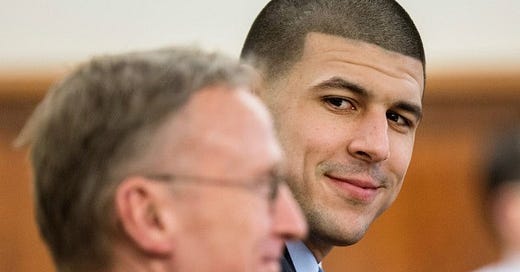Aaron Hernandez Appeal Could Change Things As His Saga Continues
Click to read the full story: Aaron Hernandez Appeal Could Change Things As His Saga Continues
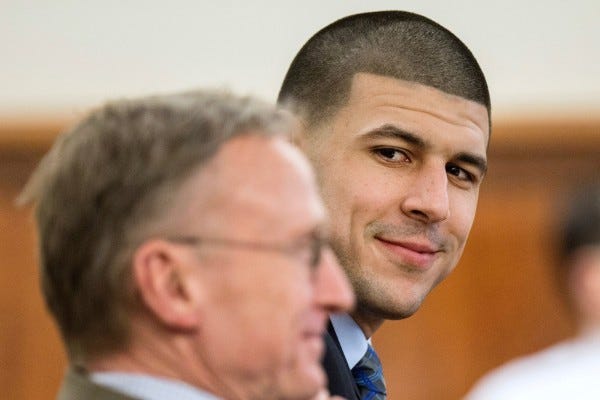
The jury might have found NFL star Aaron Hernandez guilty of first-degree murder in the slaying of Odin L. Lloyd, but his appellate team is already scouring the trial transcript in preparation to filing their brief. Then there’s that other trial in Boston where he is accused of killing two other men.
Hernandez is entitled to appeal his case, and as with any first-degree murder convictions, things are never simple. Whatever the outcome of the appeal, with his other trials coming up, it doesn’t look like Hernandez will be seeing freedom any time soon, but circumstances could shift to change his sentencing. Whenever a case seems very cut and dry, something always pops up to muddy the works.
The former New England Patriots star entered the state prison system following his conviction in Bristol Superior Court, where a clerk announced he would remain incarcerated for “a term of your natural life without the possibility of parole.”
But Hernandez is entitled to an appeal before the state’s highest court, and there are “always complex issues that arise in first-degree murder convictions,” said Jeffrey Denner, a prominent Boston defense lawyer.
He said Hernandez’s legal team in the Boston case will have to assume the prior conviction “may well not stand, and what really is standing between Hernandez and liberty is going to be the result of the Boston case,” Denner said.
The two cases differ in a few key aspects.
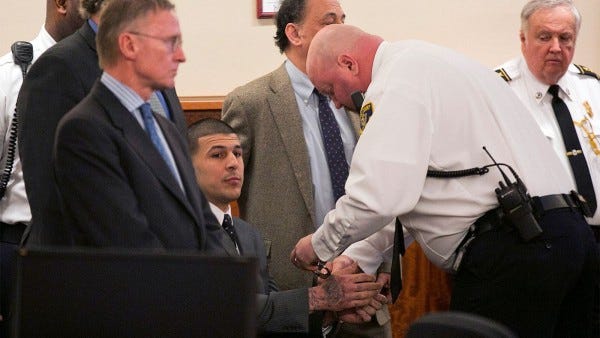
In Bristol County, prosecutors lacked a murder weapon or an eyewitness who could testify about Lloyd’s slaying in June 2013 in an industrial park near Hernandez’s North Attleborough home. But the government won a conviction largely on the strength of phone records, video surveillance, and forensic evidence that tied Hernandez to the killing.
In the second case, by contrast, Suffolk County prosecutors have the .38 caliber gun that Hernandez allegedly used in the fatal drive-by shootings of Daniel Abreu, 29, and Safiro Furtado, 28, in July 2012 in Boston’s South End.
There is also the possibility of eyewitnesses in the Boston case. Friends who were in a car with Abreu and Furtado survived the shooting, and Alexander Bradley, a former associate of Hernandez who testified against him in the Bristol County murder case, was with Hernandez when he allegedly opened fire on the vehicle in Boston, court records show.
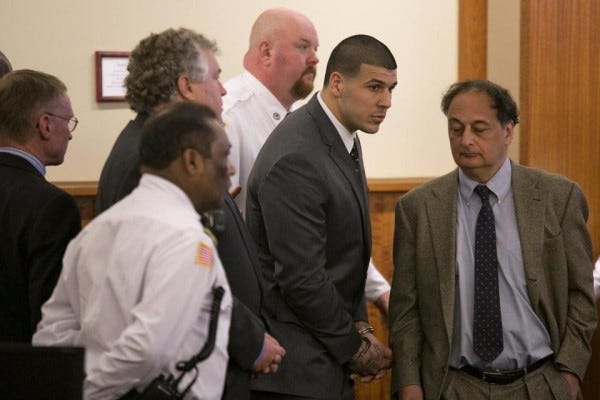
A spokesman for Suffolk District Attorney Daniel F. Conley declined to say whether Bradley or any of the survivors would testify against Hernandez, though Conley described Bradley as a witness after Hernandez’s arraignment in Suffolk Superior Court in May 2014. Bradley alleges in a lawsuit that Hernandez shot him in the face in Florida in 2013. He is now jailed in Connecticut on unrelated charges. A lawyer for Bradley did not return messages seeking his comment.
Hernandez, 25, has pleaded not guilty to two counts of murder and several weapons charges in the Boston case, which was initially slated for trial in May; a new trial date has not been set. Hernandez’s lawyers in the Bristol case, who are also the attorneys of record in the Boston case, could not be reached for comment.
Suffolk prosecutors will have reason to pursue their case aggressively, even though Hernandez is already serving a life term, said Rosanna Cavallaro, a Suffolk University Law professor and former state prosecutor. She noted that Hernandez allegedly killed Abreu and Furtado after a chance encounter at a nightclub.
“You’re talking about a double homicide of strangers, which is a pretty extraordinary kind of crime,” Cavallaro said. “Prosecutors are supposed to stand up for the people, and the idea that you can’t go to a club in Boston and come home safely is a troubling proposition.”
According to prosecutors, Hernandez became enraged after Abreu bumped into him at Cure, a Theater District nightclub, causing Hernandez to spill his drink. Abreu and Furtado, friends who had grown up in Cape Verde and were working as cleaners, later left the club with three other men in a BMW sedan driven by Abreu, investigators have said.
Prosecutors allege that Hernandez felt disrespected and was following the BMW in a sport-utility vehicle at 2:30 a.m. when Abreu stopped at a red light on Shawmut Avenue, about to turn onto Herald Street. The SUV pulled alongside, prosecutors say, as Hernandez allegedly fired five shots, killing Abreu and Furtado and wounding a third man.
During a news conference on Wednesday, Salvador Furtado said he wanted to see his son’s alleged killer pay for his crimes, telling reporters that “justice in America is very strong.”
In the Bristol case, the defense presented only three witnesses. But over 10 weeks of testimony, defense attorney James Sultan vigorously cross-examined forensic experts who linked Hernandez to the scene. In his closing argument, however, Sultan told jurors that Hernandez had witnessed Lloyd’s slaying. Legal observers contacted by the Globe said they did not believe the defense erred by conceding that Hernandez was at the crime scene, even though one juror told reporters that “we were all shocked” by the admission.
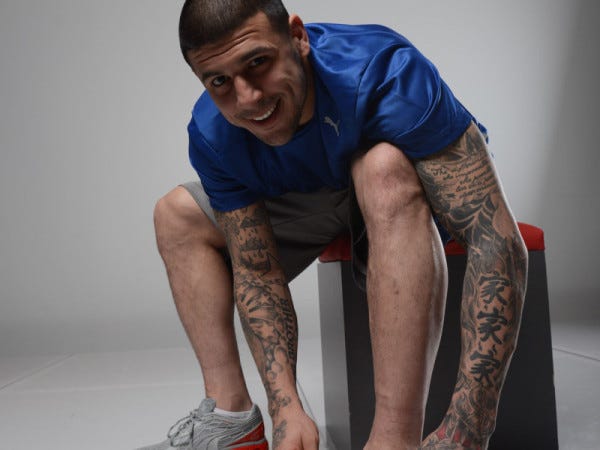
Stephen J. Weymouth, a Boston defense lawyer who followed the case closely, said he felt the defense would have lost credibility with jurors by denying that Hernandez was present, based on the evidence that tied him to the scene. The admission “was a bit of a gamble, for sure, but I think it had to be addressed,” Weymouth said.
Sultan also suggested during closings that one of Hernandez’s codefendants, who will be tried separately, may have killed Lloyd in a drug-induced state, and that Hernandez could have seized the murder weapon from them, to protect himself, when they all returned to his home.
Jurors were not persuaded, and Hernandez will now spend the rest of his life in prison, barring a successful appeal before the state Supreme Judicial Court. The appeal process could take years, experts said.
Hernandez’s appellate team will scour the trial transcript before filing their brief with the SJC, said Daniel S. Medwed, a Northeastern University law professor who handled appeals as a public defender in New York. Oral arguments will be heard after additional court filings.
“This is going to be a thousand page-plus trial transcript” since more than 130 witness testified at Hernandez’s trial in Bristol County, Medwed said.
In the meantime, Hernandez is being held at MCI-Cedar Junction in Walpole, the state’s maximum security intake center for men, which is less than 2 miles from Gillette Stadium. Inmates usually stay for at least three months before officials determine the state prison where they will serve out their sentences, according to the Department of Correction.
On Wednesday, Hernandez weighed in on his conviction as he prepared to leave the custody of the Bristol County jail, where he had been held pending trial, Sheriff Thomas Hodgson said in a phone interview.
He said Hernandez told the officers who had transferred him to and from court that “I’m gonna miss you guys, and they got it wrong.”
The post Aaron Hernandez Appeal Could Change Things As His Saga Continues appeared first on Movie TV Tech Geeks News By: Jackie Warner

